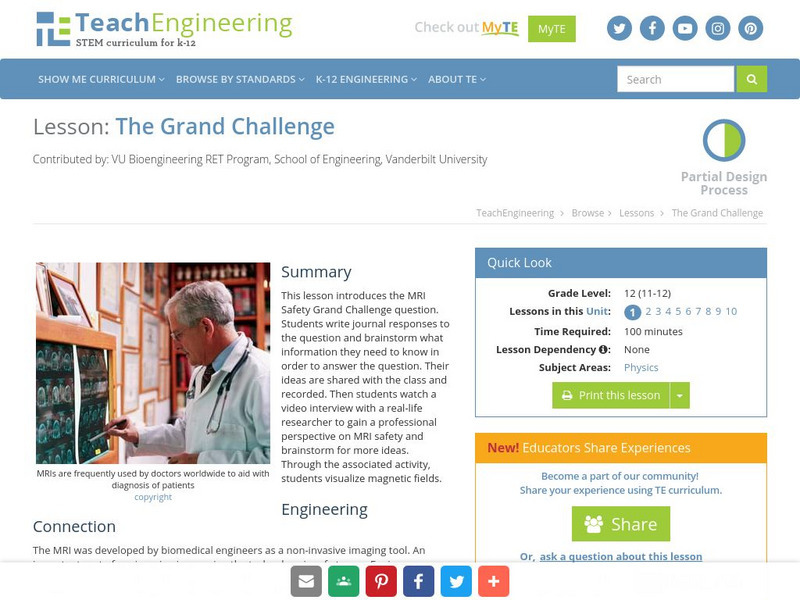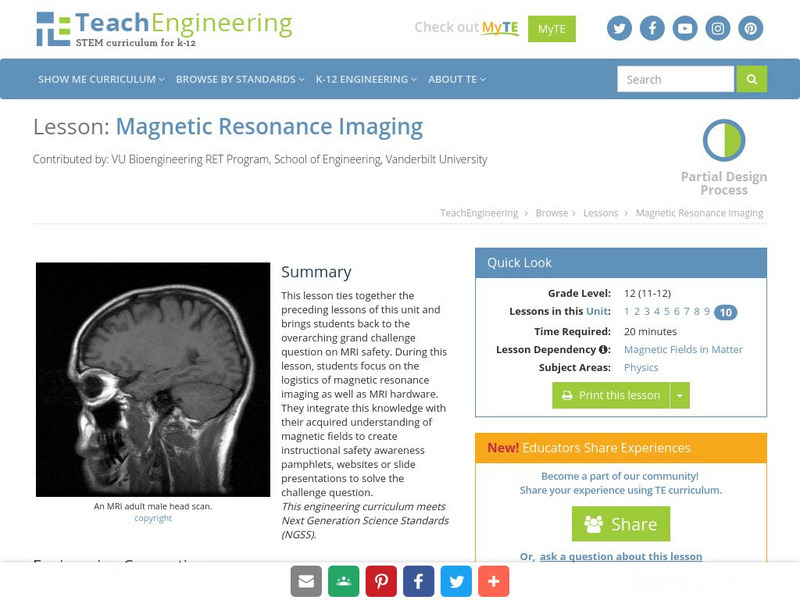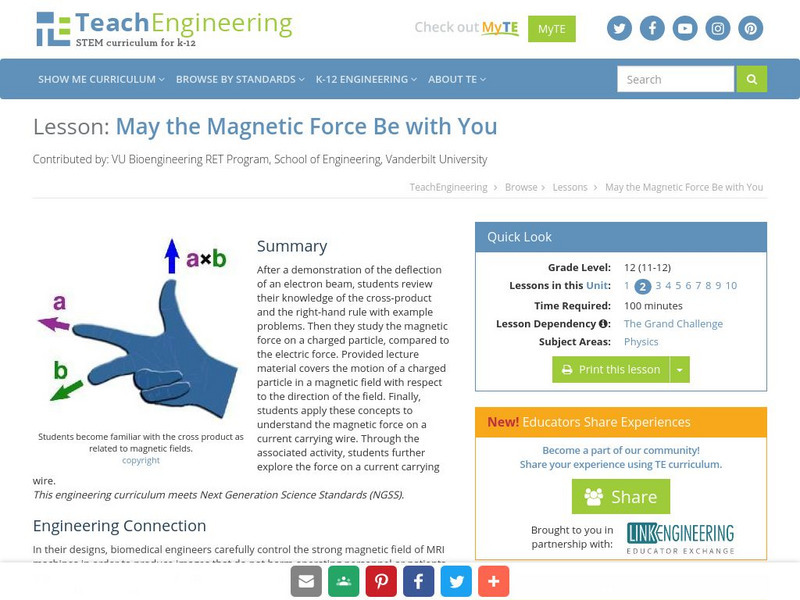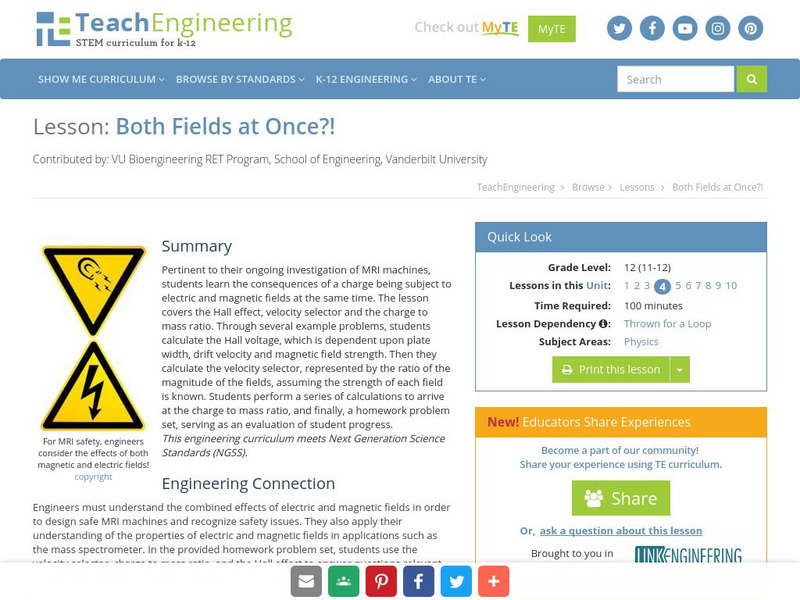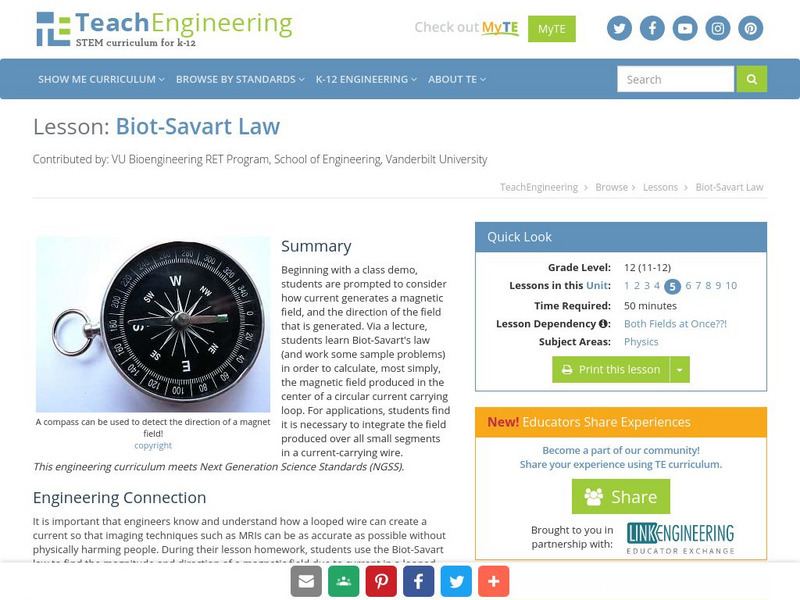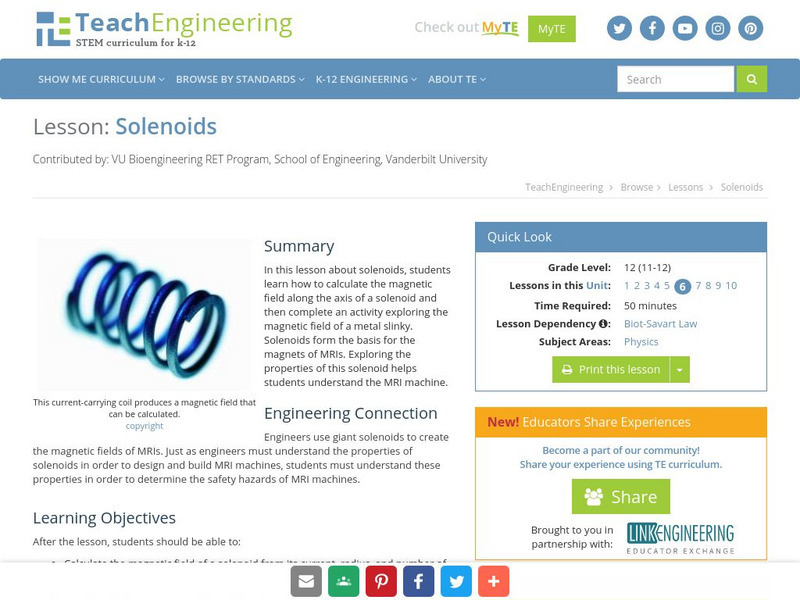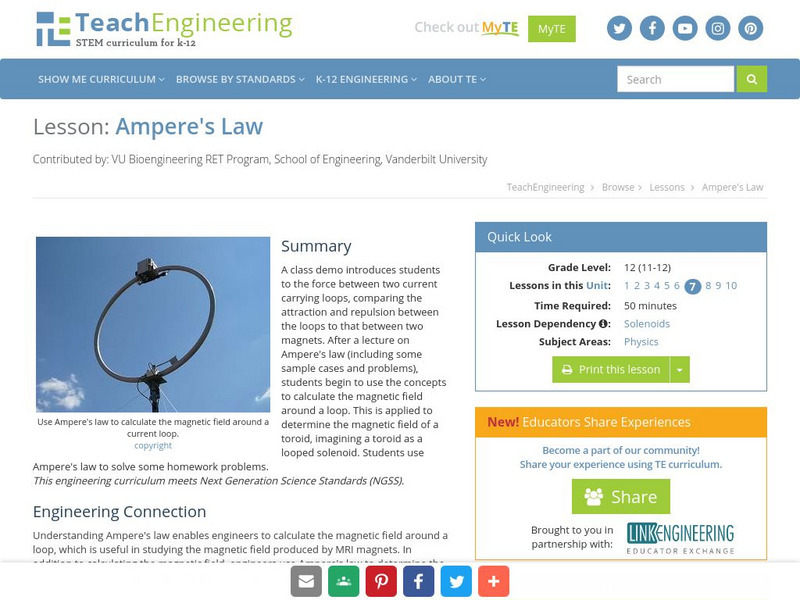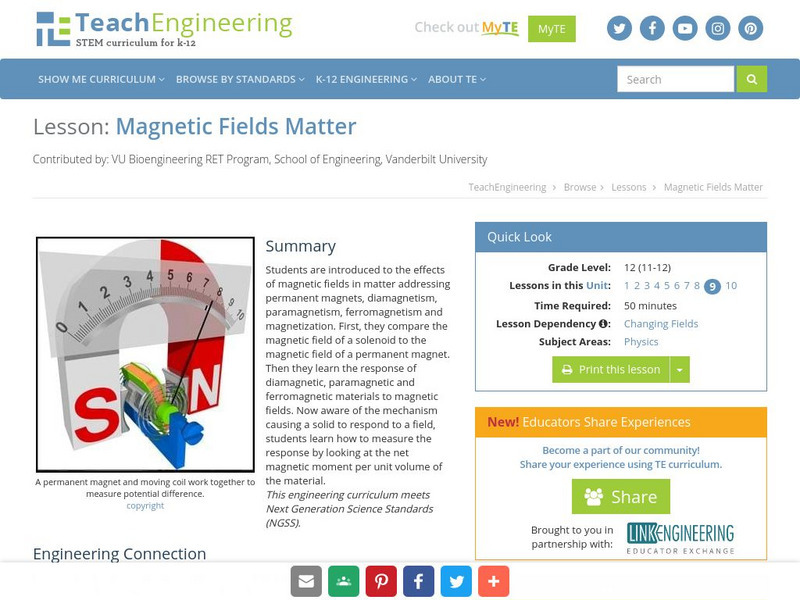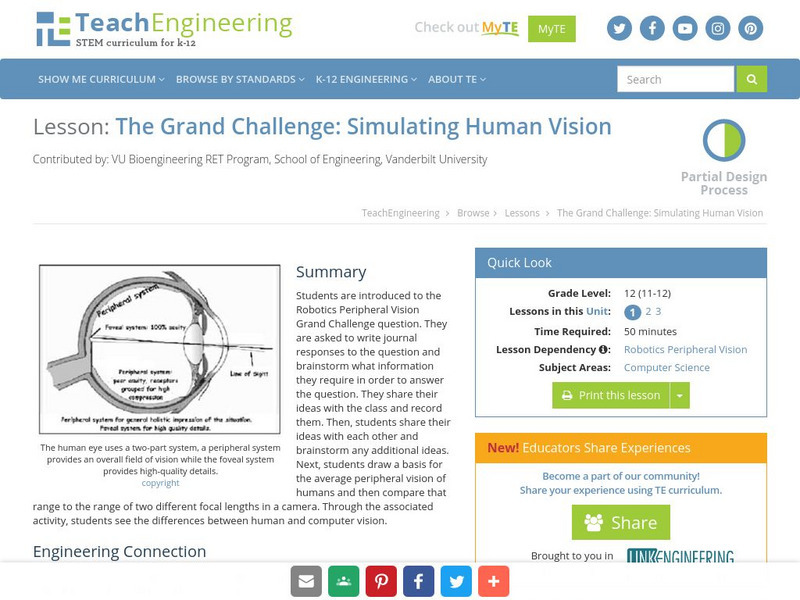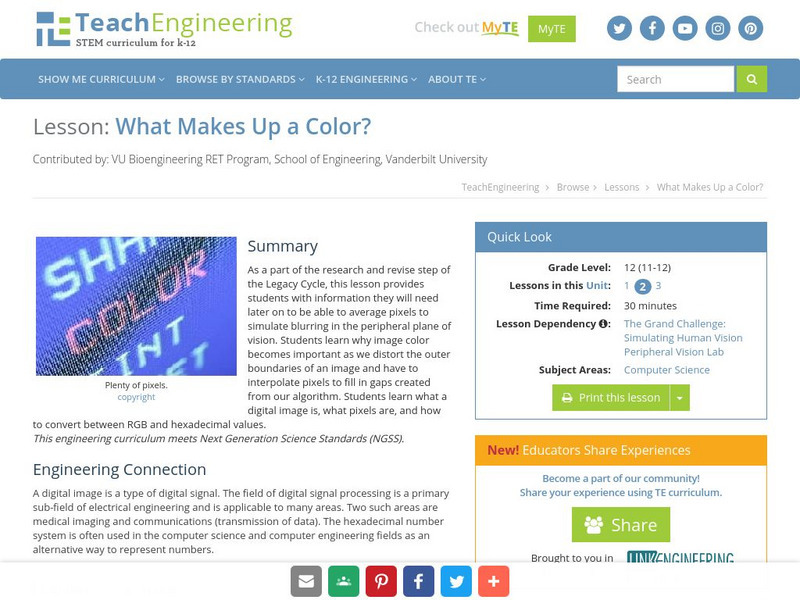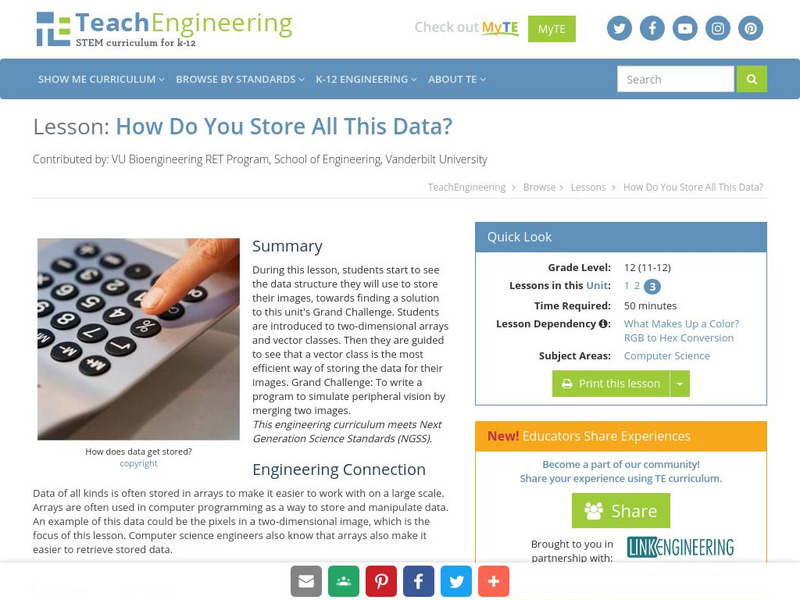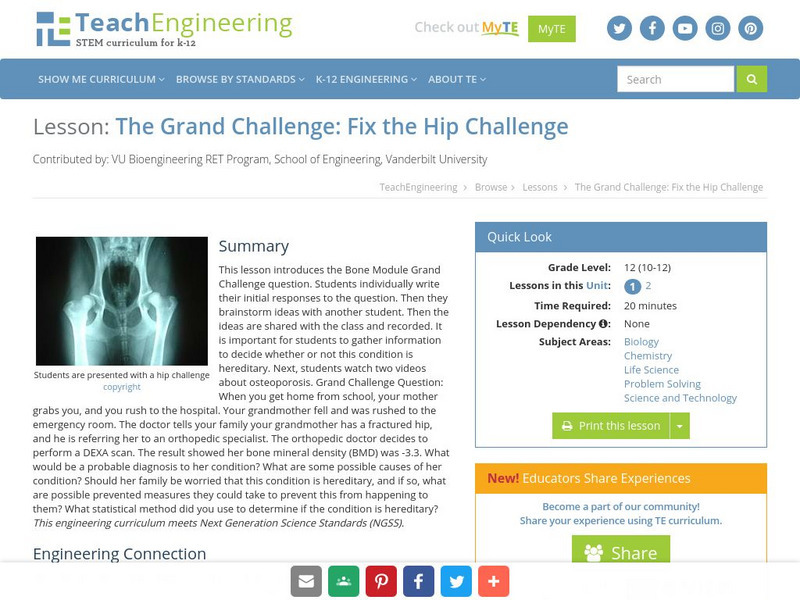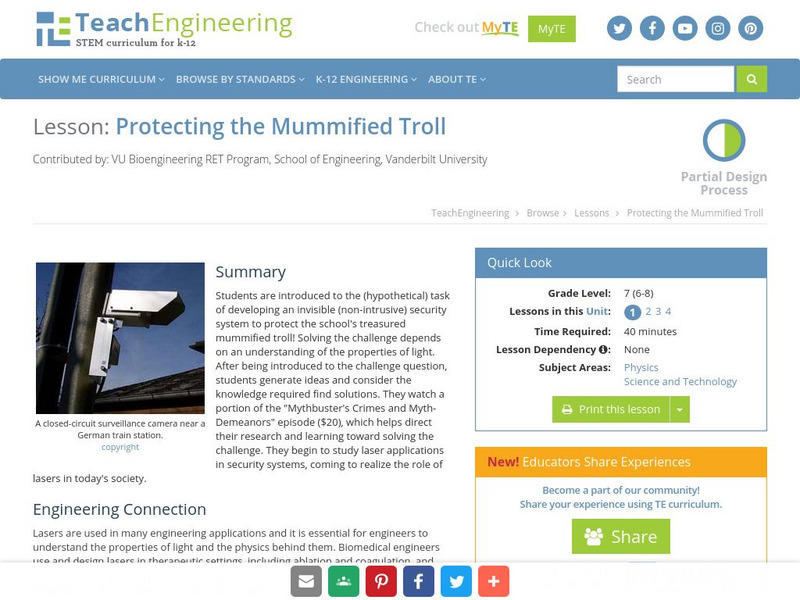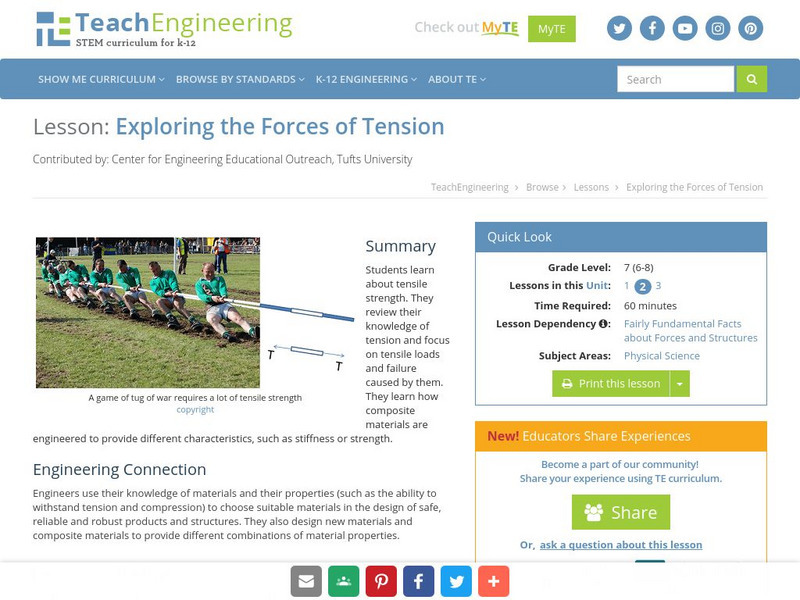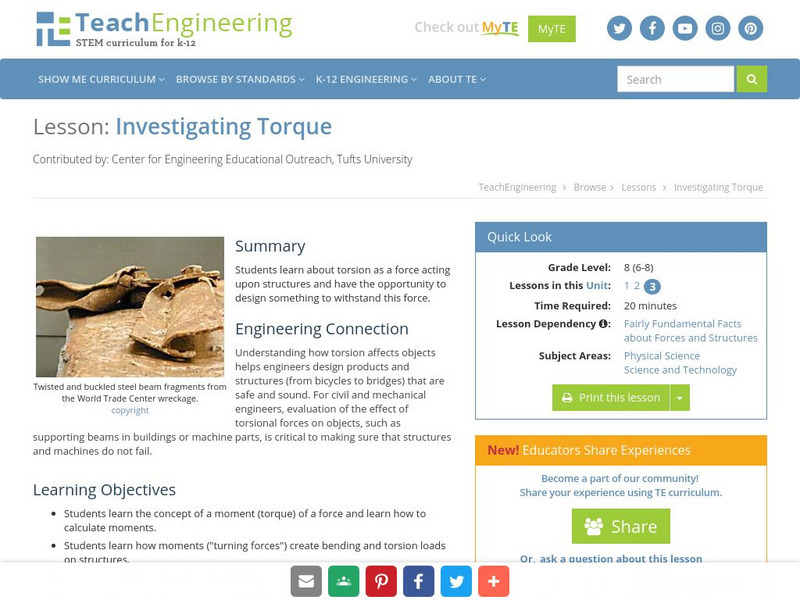TeachEngineering
Teach Engineering: The Keepers of the Gate Challenge
Students are presented with a real-life problem as a challenge to investigate, research and solve. Specifically, they are asked to investigate why salt water helps a sore throat, and how engineers apply this understanding to solve other...
TeachEngineering
Teach Engineering: Cell Membrane Structure and Function
Students learn about the different structures that comprise cell membranes, fulfilling part of the Research and Revise stages of the legacy cycle. Students view online animations of cell membrane dynamics (links provided). Then they...
TeachEngineering
Teach Engineering: The Grand Challenge
This lesson introduces the MRI Safety Grand Challenge question. Students are asked to write journal responses to the question and brainstorm what information they will need to answer the question. The ideas are shared with the class and...
TeachEngineering
Teach Engineering: Magnetic Resonance Imaging
This activity ties the preceding lessons together and brings students back to the grand challenge question on MRI safety. During this activity, students focus on the logistics of magnetic resonance imaging as well as the MRI hardware....
TeachEngineering
Teach Engineering: May the Magnetic Force Be With You
This lesson begins with a demonstration of the deflection of an electron beam. Students then review their knowledge of the cross product and the right hand rule with sample problems. After which, students study the magnetic force on a...
TeachEngineering
Teach Engineering: Thrown for a Loop
In this lesson plan, students begin to focus on the torque associated with a current carrying loop in a magnetic field. Students are prompted with example problems and use diagrams to visualize the vector product. In addition, students...
TeachEngineering
Teach Engineering: Both Fields at Once?!
This lesson discusses the result of a charge being subject to both electric and magnetic fields at the same time. It covers the Hall effect, velocity selector, and the charge to mass ratio. Given several sample problems, students learn...
TeachEngineering
Teach Engineering: Biot Savart Law
This lesson begins with a demonstration prompting students to consider how current generates a magnetic field and the direction of the field that is generated. Through formal lecture, students learn Biot-Savart's law in order to...
TeachEngineering
Teach Engineering: Solenoids
This lesson plan discusses solenoids. Young scholars learn how to calculate the magnetic field along the axis of a solenoid and complete an activity exploring the magnetic field of a metal slinky. Solenoids form the basis for the magnet...
TeachEngineering
Teach Engineering: Ampere's Law
The lesson begins with a demonstration introducing students to the force between two current carrying loops, comparing the attraction and repulsion between the loops to that between two magnets. After formal lecture on Ampere's law,...
TeachEngineering
Teach Engineering: Changing Fields
This lesson begins with an activity in which students induce EMF in a coil of wire using magnetic fields. Then, demonstrations on Eddy currents show how a magnetic field can slow magnets just as Eddy currents are used to slow large...
TeachEngineering
Teach Engineering: Magnetic Fields Matter
This lesson introduces learners to the effects of magnetic fields in matter addressing permanent magnets, diamagnetism, paramagnetism, ferromagnetism, and magnetization. First students must compare the magnetic field of a solenoid to the...
TeachEngineering
Teach Engineering: The Grand Challenge: Simulating Human Vision
Learners are introduced to the Robotics Peripheral Vision Grand Challenge question. They are asked to write journal responses to the question and brainstorm what information they require to answer the question. Their ideas are shared...
TeachEngineering
Teach Engineering: What Makes Up a Color?
As a part of the research and revise step of the Legacy Cycle, this lesson provides students with information they will need later on to be able to average pixels to simulate blurring in the peripheral plane of vision. Students learn why...
TeachEngineering
Teach Engineering: How Do You Store All This Data?
During this lesson, students start to see the data structure they will use to store their images, towards finding a solution to this unit's Grand Challenge. Students are introduced to two-dimensional arrays and vector classes. Then they...
TeachEngineering
Teach Engineering: The Grand Challenge: Fix the Hip Challenge
This lesson plan introduces the Bone Module Grand Challenge question. Learners are asked to write their initial responses to the question alone. They will then brainstorm ideas with one other student. Finally, the ideas are shared with...
TeachEngineering
Teach Engineering: Skeletal System Overview
Young scholars will learn about bone structure, bone development and growth, and bone functions. Later, students will apply this understanding to answer the Challenge Question presented in the "Fix the Hip" lesson plan and use the...
TeachEngineering
Teach Engineering: Protecting the Mummified Troll
Learners are introduced to the (hypothetical) task of developing an invisible (non-intrusive) security system to protect the school's treasured mummified troll! Solving the challenge depends on an understanding of the properties of...
TeachEngineering
Teach Engineering: Learning Light's Properties
Students learn the basic properties of light--the concepts of light absorption, transmission, reflection and refraction, as well as the behavior of light during interference. Lecture information briefly addresses the electromagnetic...
TeachEngineering
Teach Engineering: Laser Types and Uses
Through two classroom demos, students are introduced to the basic properties of lasers through various mediums. In the Making an Electric Pickle demonstration, students see how cellular tissue is able to conduct electricity, and how this...
TeachEngineering
Teach Engineering: Security System Design
Middle schoolers apply everything they have learned about light properties and laser technologies to designing, constructing and presenting laser-based security systems that protect the school's mummified troll. In the associated...
TeachEngineering
Teach Engineering: Exploring the Forces of Tension
Students will review their knowledge of tension and focus on tensile loads and failure caused by them.
TeachEngineering
Teach Engineering: Investigating Torque
This lesson focuses on torsion as a force acting upon structures. Students will have the opportunity to design something to withstand this force.
TeachEngineering
Teach Engineering: Introduction to Environmental Engineering
Students are presented with examples of the types of problems that environmental engineers solve, specifically focusing on air and land quality issues. Air quality topics include air pollution sources, results of poor air quality...




